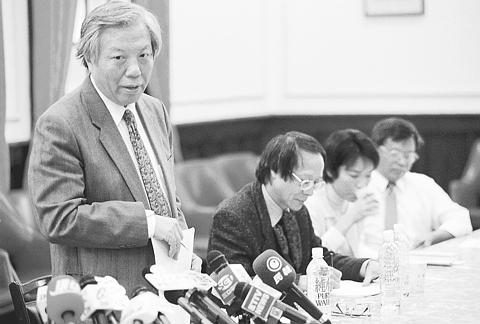Academics yesterday warned that the KMT's proposal to put its assets into trust would be a second chance for the party to launder the party's illegally acquired property. The KMT's presidential candidate Lien Chan (
The scholars said the proposal is incapable of resolving the real problem of handling assets that were obtained illegally unless the exact origins of the assets are clarified.
Tsai Tzung-jen (1/22宗珍), an associate professor of law at Tamkang University, said that the KMT had gotten its first chance to "bleach" the assets in 1992, when the Civil Organizations Law was revised to allow political parties to register themselves as a corporation.

PHOTO: CHEN CHENG-CHANG, TAIPEI TIMES
"Thereafter, the KMT obtained the legitimacy to control seven share holding companies and numerous assets," Tsai said.
Before that, the assets were registered under the names of individuals, since there was no legal basis for political parties to own assets.
"We must look into how the ownership of the assets was transferred to the KMT," Tsai said.
Since the trust system is designed to separate the ownership from management, the sources of the assets are left out of scrutiny.
Tsai said the problem of money politics must be resolved by "de-corporatizing" political parties to prohibit them from engaging in profit-making businesses.
"If the issue is not addressed, putting the assets into a trust will give the KMT a more solid excuse to increase the amount of its property," Tsai said.
Chang Ching-hsi (張2M溪), a professor of economics at National Taiwan University, pointed out that while much of the real estate now in KMT hands was handed over by the Japanese colonial government in the 1950's when it returned national assets to the new government, the KMT also took advantage of its political monopoly in the past to skim from government coffers.
Once transferring money from the national coffers became more difficult as the country opened up its practices to more public scrutiny, the KMT has over the past decade actively engaged in running businesses, several of which are monopolies, Chang said.
Chang said the assets should return to where they belong.
"It is meaningless to take others' property and put it into a trust," Chang said.
He said the involvement of gangsters in the political process and pervasive money politics can all be traced to the existence of KMT-run businesses.
Wang Wen-yu (?y?憰t), an associate professor of law at NTU, said even if the KMT actually puts its assets into a trust, it must spell out the purpose of the trust -- whether it is for "some specific public interests" or the pursuit of "the best investment interests."
Chien Yung-xiang (

AIR SUPPORT: The Ministry of National Defense thanked the US for the delivery, adding that it was an indicator of the White House’s commitment to the Taiwan Relations Act Deputy Minister of National Defense Po Horng-huei (柏鴻輝) and Representative to the US Alexander Yui on Friday attended a delivery ceremony for the first of Taiwan’s long-awaited 66 F-16C/D Block 70 jets at a Lockheed Martin Corp factory in Greenville, South Carolina. “We are so proud to be the global home of the F-16 and to support Taiwan’s air defense capabilities,” US Representative William Timmons wrote on X, alongside a photograph of Taiwanese and US officials at the event. The F-16C/D Block 70 jets Taiwan ordered have the same capabilities as aircraft that had been upgraded to F-16Vs. The batch of Lockheed Martin

GRIDLOCK: The National Fire Agency’s Special Search and Rescue team is on standby to travel to the countries to help out with the rescue effort A powerful earthquake rocked Myanmar and neighboring Thailand yesterday, killing at least three people in Bangkok and burying dozens when a high-rise building under construction collapsed. Footage shared on social media from Myanmar’s second-largest city showed widespread destruction, raising fears that many were trapped under the rubble or killed. The magnitude 7.7 earthquake, with an epicenter near Mandalay in Myanmar, struck at midday and was followed by a strong magnitude 6.4 aftershock. The extent of death, injury and destruction — especially in Myanmar, which is embroiled in a civil war and where information is tightly controlled at the best of times —

Taiwan was ranked the fourth-safest country in the world with a score of 82.9, trailing only Andorra, the United Arab Emirates and Qatar in Numbeo’s Safety Index by Country report. Taiwan’s score improved by 0.1 points compared with last year’s mid-year report, which had Taiwan fourth with a score of 82.8. However, both scores were lower than in last year’s first review, when Taiwan scored 83.3, and are a long way from when Taiwan was named the second-safest country in the world in 2021, scoring 84.8. Taiwan ranked higher than Singapore in ninth with a score of 77.4 and Japan in 10th with

SECURITY RISK: If there is a conflict between China and Taiwan, ‘there would likely be significant consequences to global economic and security interests,’ it said China remains the top military and cyber threat to the US and continues to make progress on capabilities to seize Taiwan, a report by US intelligence agencies said on Tuesday. The report provides an overview of the “collective insights” of top US intelligence agencies about the security threats to the US posed by foreign nations and criminal organizations. In its Annual Threat Assessment, the agencies divided threats facing the US into two broad categories, “nonstate transnational criminals and terrorists” and “major state actors,” with China, Russia, Iran and North Korea named. Of those countries, “China presents the most comprehensive and robust military threat